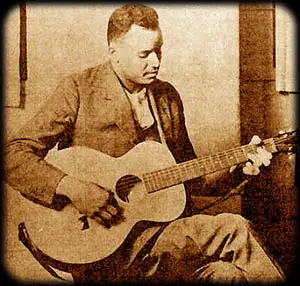SCRAPPER BLACKWELL
 Scrapper Blackwell was one of the early Blues guitarists whose jazz-based, single-note style was to prove hugely influential. Like his contemporary Lonnie Johnson, Scrapper’s powerful phrasing on his acoustic guitar showed the way for later electric blues guitarists to express themselves. He also wrote some classic Blues tunes and, with his piano-playing partner Leroy Carr, recorded one of the biggest hits of the day, which went on to start a national trend for guitar/piano Blues duets.
Scrapper Blackwell was one of the early Blues guitarists whose jazz-based, single-note style was to prove hugely influential. Like his contemporary Lonnie Johnson, Scrapper’s powerful phrasing on his acoustic guitar showed the way for later electric blues guitarists to express themselves. He also wrote some classic Blues tunes and, with his piano-playing partner Leroy Carr, recorded one of the biggest hits of the day, which went on to start a national trend for guitar/piano Blues duets.
Francis Hillman Blackwell was born into a big, part-Cherokee family in 1903, probably somewhere in the South, but they soon relocated to Indianapolis. ‘Scrapper’ got his nickname for his quick temper, and as a kid and he built his own ‘cigar box’ guitar to play along with his Dad, who played the fiddle. He proved to be very talented as he progressed with his playing, and he began to travel widely, but he was making good money from ‘moonshine’ during prohibition and never considered being a full-time musician. He met the Nashville pianist Leroy Carr in Indianapolis and the pair began playing together, finding that Leroy’s heavy left hand gave ‘Scrapper’ the freedom to exploit an extravagant, jazzy guitar style. They lived a wild life in the booze-soaked underworld until June 1928, when Scrapper recorded his ‘Kokomo Blues’ for the Vocalion label in Indianapolis. This was a good-selling record at the time, but when it was re-recorded in 1934 by James Arnold in Chicago, it was a bigger hit and gave him his enduring Blues name. The song was also picked up later by Robert Johnson as ‘Sweet Home Chicago’. A few days after that fateful session, Scrapper accompanied Leroy on his song ‘How Long, How Long?’ which became a huge hit record and started a national fashion for guitar/piano duets. The pair recorded over 100 tracks together, and were a popular live act as they toured the South and Midwest.
Scrapper’s exquisite playing on ‘Blues Before Sunrise’;
Scrapper continued to make his own records, sometimes under the name ‘Frankie Black’ and was often called in to play with other well known names like Georgia Tom Dorsey, and Chippie Hill. In 1935 Leroy Carr died from kidney problems brought on by drinking, at the age of 30, and Scrapper was so distraught he gave up playing in public for more than 20 years, dedicating his final recording session a few weeks after Leroy’s demise to “my old pal”.
Scrapper was ‘rediscovered’ in 1959 when he cut an acclaimed album for the Bluesville label, but just as the Blues Festival scene on both sides of the Atlantic was about to do so much for those originators of the Blues as they were being brought out of obscurity, Scrapper was shot dead when he was mugged in an Indianapolis back-alley in 1962.
